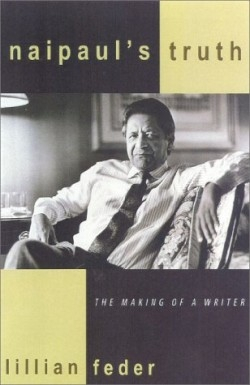Naipaul's Truth
The Making of a Writer
Over the course of five decades and two dozen books, V. S. Naipaul has taken his readers on journeys through the postcolonial landscapes of India, the West Indies, and the Middle East. (Some would consider his 1989 bestseller, A Turn in the South, about the states of the former confederacy, to be in the same pattern.) Always at the heart of his work, whether fiction or nonfiction, is the impact of history and society on the individual. Recently, however, critics have accused Naipaul of being an apologist for neocolonialsim, of being hostile toward any mobilization for change in the cultures about which he writes. In Naipaul’s Truth, Feder seeks to defend Naipaul from such accusations.
Distinguished Professor Emerita of English, Classics, and Comparative Literature at the City University of New York, Feder spends a great deal of time laying out the arguments of those critics whom she accuses of being short-sighted and of reading Naipaul’s body of work through a racialist lens that is reductive. She defends Naipaul by offering close readings of his work, grouping them into three categories corresponding to the genres in which Naipaul works: autobiography; travel narratives, history, journalism; and fiction.
Feder’s in-depth knowledge of Naipaul’s work is evident from her discussions. She moves fluidly through his many books, carefully documenting how the themes that concern Naipaul appear, reappear, and change over time. The portrait of Naipaul that emerges is of a sensitive and thoughtful writer who is genuinely concerned with the masses of people whose stories and perspectives are seldom documented.
The study, however, has a couple of fairly serious weaknesses. While Feder’s primary purpose in writing the book is to defend Naipaul from his critics, she does not demonstrate any significant understanding of the postcolonial theory that fuels their arguments. The book contains, for example, only one brief reference to Edward Said, whose work is central to postcolonial studies. Her defense of Naipaul would be stronger if she demonstrated better understanding the theoretical underpinnings of the attackers. Also, while some plot summary is necessary in a work as sweeping as this, at times the summary is excessive.
Feder may initiate a reconsideration of Naipaul’s work, but this is not the work that will ultimately clear him of the accusations that have been made.
Reviewed by
Erik Bledsoe
Disclosure: This article is not an endorsement, but a review. The publisher of this book provided free copies of the book to have their book reviewed by a professional reviewer. No fee was paid by the publisher for this review. Foreword Reviews only recommends books that we love. Foreword Magazine, Inc. is disclosing this in accordance with the Federal Trade Commission’s 16 CFR, Part 255.

